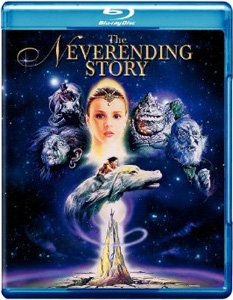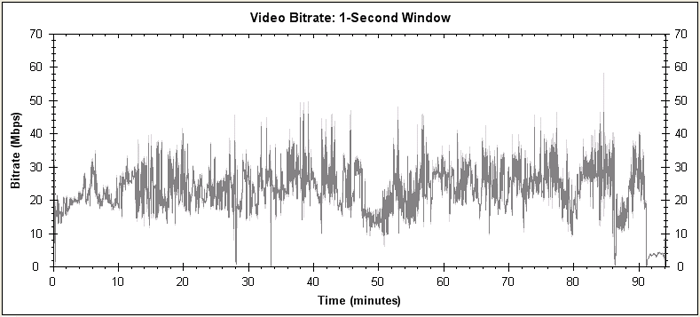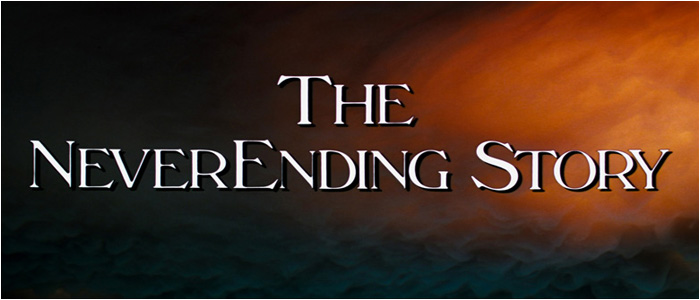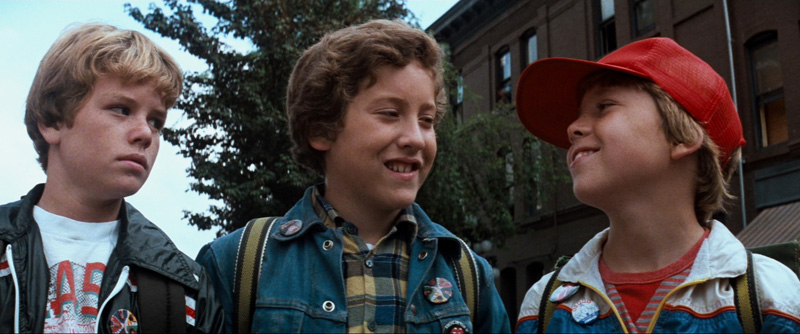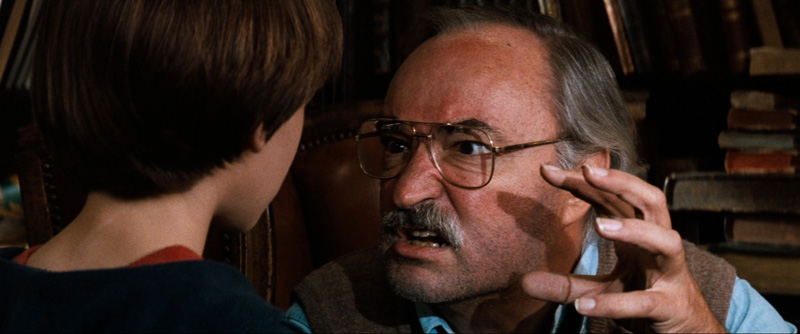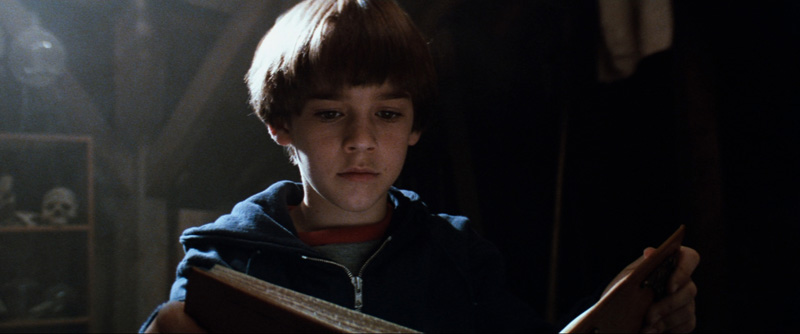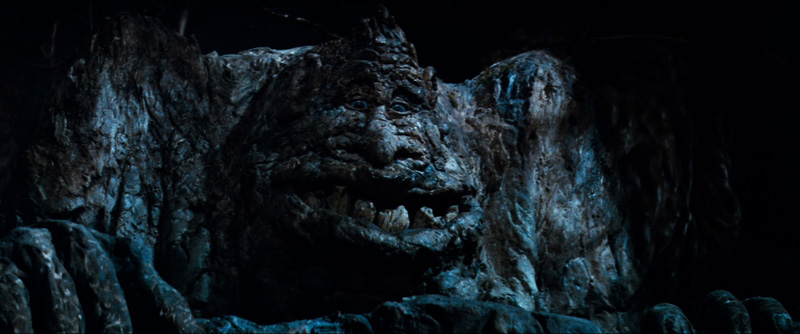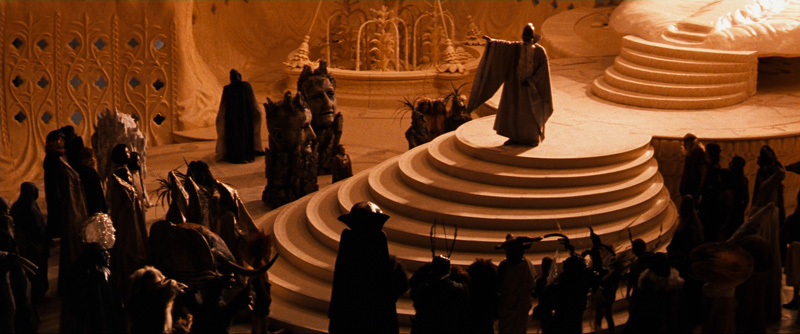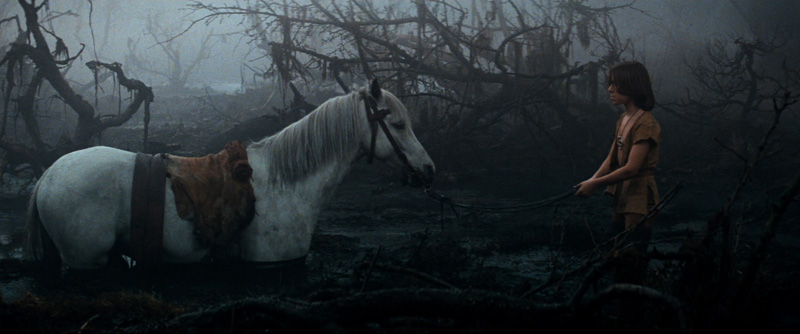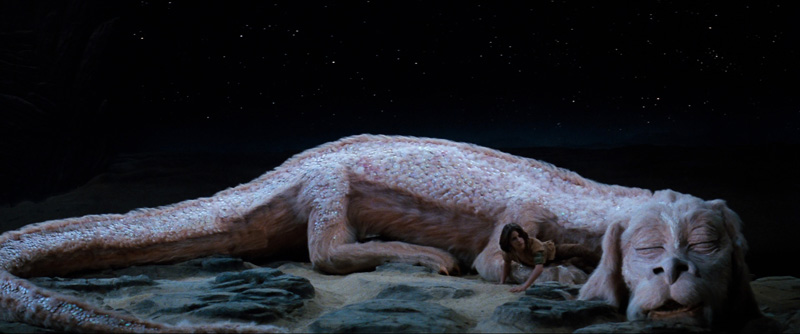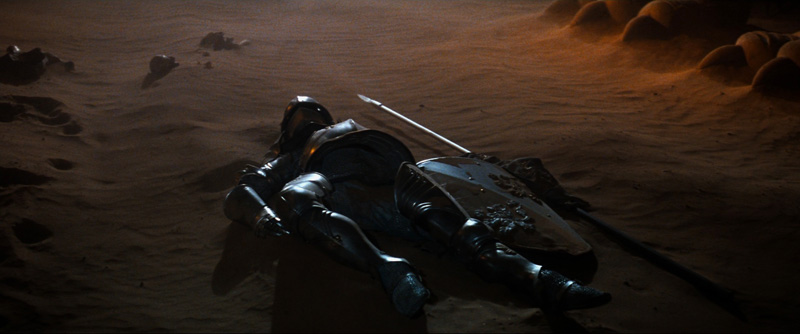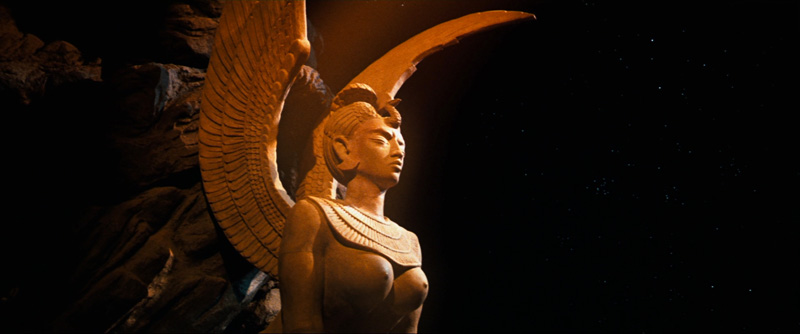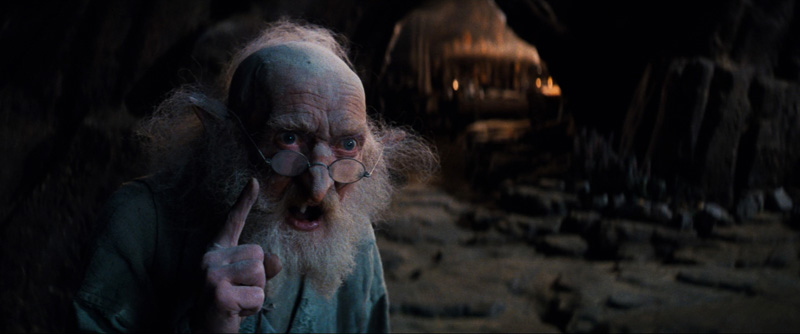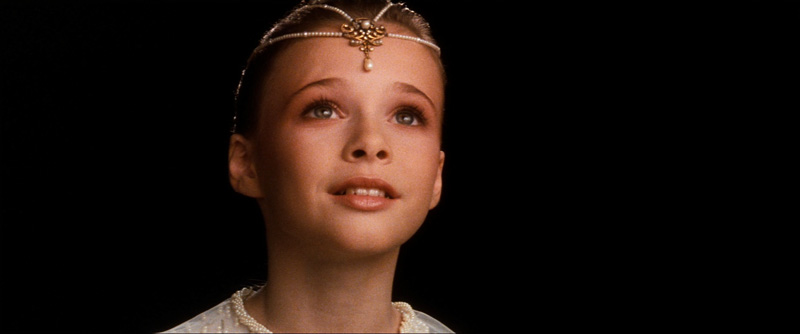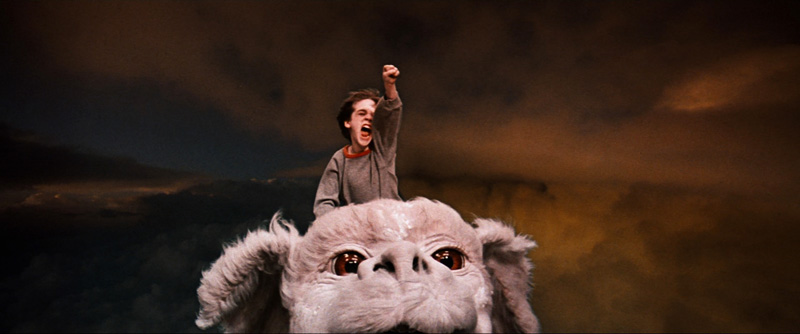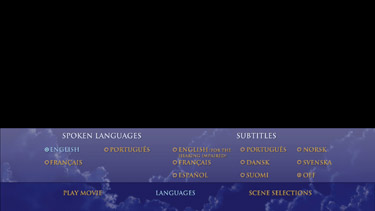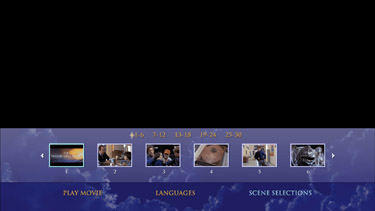Review by Leonard Norwitz
Studio:
Theatrical: Bernd Eichinger/Bernd Schaefers
Blu-ray: Warner Home Video
Disc:
Region: FREE!
(as verified by the
Momitsu region FREE Blu-ray player)
Runtime: 1:34:04.597
Disc Size: 19,471,971,628 bytes
Feature Size: 19,294,752,768 bytes
Video Bitrate: 23.06 Mbps
Chapters: 30
Case: Standard Blu-ray case
Release date:
March 2nd, 2010
Video:
Aspect ratio: 2.35:1
Resolution: 1080p / 23.976 fps
Video codec: VC-1 Video
Audio:
DTS-HD Master Audio English 2222 kbps 5.1 / 48 kHz / 2222
kbps / 16-bit (DTS Core: 5.1 / 48 kHz / 1509 kbps / 16-bit)
Dolby Digital Audio French 192 kbps 2.0 / 48 kHz / 192 kbps
/ Dolby Surround
Dolby Digital Audio Portuguese 192 kbps 1.0 / 48 kHz / 192
kbps
Subtitles:
English, Danish, Finnish, French, Norwegian, Portuguese,
Spanis, Swedishh, none
Extras:
• (nichts)
The Film:
6
Wolfgang Peterson is known for such action-packed films as
The Perfect Storm, Air Force One, and Poseidon, but also for
more imaginative films like Troy and Enemy Mine and the
movie that nailed the Malkovich persona, In the Line of
Fire. He began work as a director for German television for
some ten years before he made the movie that would bring him
international acclaim: the intensely claustrophobic
submarine thriller Das Boot. I can well believe his next
film was meant to serve as a kind of antidote: The
Neverending Story is based on a popular children's book
published only a few years earlier in 1979 by Michael Ende:
Die unendliche Geschichte (It's tempting to speculate about
the pun on his name.)
Made in Germany with an English speaking cast and clearly
targeted for a young and international audience, The
Neverending Story tells of a pre-teen boy, Bastian (Barret
Oliver), who, while trying to deal with the death of his
mother, loses himself in his books and dreams. He is bullied
regularly on his way to school (it's not even clear if he
ever manages to get to class), and is admonished by his
father for spending too much time dreaming to the expense of
his schoolwork.
We can see where this is all leading in a heartbeat, so when
Bastian stumbles into a bookstore where the old bookseller
tells him about a book that "isn't safe" like others he's
read where he can return to being a little boy whenever he
puts it down. (Let us note that the old man is reading this
book before Bastian comes into the store and he's a little
annoyed that his concentration is interrupted.) Bastian is
fascinated. He "borrows" it, and reads it, and reads it, and
reads it. He can't get enough of the adventures of its hero,
another boy named Atreyu (Noah Hathaway) who is chosen by an
ailing Empress (Tami Stronach) to rescue Fantasia from "The
Nothing" which is gobbling up everything in its path. So off
Atreyu goes on a perilous Quest to find some unnamed thing
that can defeat The Nothing and restore the natural order of
things. Bastian gets so wrapped up in the story he sometimes
has the feeling that there is a kind of dialogue possible
between himself and the story's characters. Because he has
made a promise to his father to stop dreaming, he is
reluctant to give himself up entirely to the pull that the
story has on his imagination.
I have some confidence that The Neverending Story will keep
the attention of children and some adults for its mere hour
and a half running time, despite the competing attraction of
today's elaborate and enticing video games, though I doubt
that youngsters will respond to the filmmakers' message that
the development of a child's own imagination is what keeps
stories alive and that stories are an essential part of our
lives. (I might go so far to say that the less they think
about this aspect of the movie, the better.) As depicted by
Peterson and Visual Effects master Brian Johnson, Atreyu's
adventures in Fantasia are relentlessly fascinating to look
at. Hathaway is a compelling hero and eleven-year old
Stronach a lovely and well-spoken Empress, though we don't
get to see her until the final reel. The fantastical
creatures and humanoids Atreyu meets on his Quest are
wonderfully, if briefly, realized.
I have to admit I was put off from the start when the
bookseller promises that "The Neverending Story" will be an
even more exciting book than others Bastian has read like
"Treasure Island," "Lord of the Rings" and "20,000 Leagues
Under the Sea." We don't get to see what the old man really
means by this promise and how it might relate to the
acknowledged classics until the very end, but by then
nothing about the story itself has elevated it to anything
remotely near the status of the classics he so readily
discards. . . although I doubt children will be so critical.
. . . which leads in a roundabout way me to my basic problem
with the movie: To begin with, I can't tell if it is for or
against reading fiction as compared to merely dreaming. I
like to think that the point of the movie, and of the book
Bastian is immersed in, is that storytelling, and the
reading of it, which is the same thing, is a deliberate act
of creative imagination, a dialogue between writer and
reader that generates tremendous creative power, and that
the writer here wants to encourage this ability in children.
But there is no evidence that Bastian doesn’t already
possess this ability. He tries to assure the bookseller of
this. The old man demands "Have you ever been Captain Nemo
trapped inside your submarine while the giant squid is
attacking you?” “Yes,” he replies. And we believe him. We
have no reason to think Bastian is careless about his 180
books, or that he needed The Neverending Story to kick start
some latent ability. More to the point, isn't this a natural
ability that just about all of us have? Once we learn to
read – and part of that process is being read to, something
we doubt Bastian's father ever did with his boy – a large
part of what keeps us involved is how it engages our
imagination. And if this is a native ability, then what's
this movie about?
Dreaming isn’t reading. It is not a conscious act of
creativity. And daydreaming, while we seem to be in command,
brings out nothing like the kind of creative forces requires
by reading (Go back to sleep, Walter!) I think it's a fair
to say of Bastian's father that he is a psychological moron.
It is dreaming that he so unfeelingly demands his boy stop
doing. He actually believes that children have control over
what they dream or whether or not they dream. (To be fair,
dad goes on to make some comments about daydreaming and
doodling that are less ignorant, if unsympathetic.) I assume
that the writers are putting these words in his father's
mouth because they are just as na´ve as he is. They lead
their movie with an injunction about dreaming whose only
function in the narrative is to require Bastian overcome a
resistance so as to give himself permission to let his
imagination have its way. But if it weren't for his father's
prohibition, he would have found his way on his own. Of
course, there wouldn't have been that cathartic "Moon
Child!" but the relationship to dad's "little talk" is
conveniently left on the cutting room floor, if indeed it
was ever considered. In any case, having found that a way to
let his imagination run wild, whether or not he had it in
the first place, Bastian is going to be impossible to live
with at home.
Image:
6/8
NOTE:
The below
Blu-ray
captures were taken directly from the
Blu-ray
disc.
The first number indicates a relative level of excellence
compared to other Blu-ray video discs on a ten-point scale.
The second number places this image along the full range of
DVD and Blu-ray discs.
This marks the first time in twenty-five years that I have
seen this movie, and I was pleased that the special effects
that created Fantasia are just as innocent yet compelling as
they were then. The creative imagination that went into its
art direction together with the team of technical people
that realized that vision on film was remarkable then and is
still a pleasure today.
Warner’s new Blu-ray transfer does this movie proud, despite
some problems. Blacks are often crushed, but in some scenes
the detail is quite good – we can even make out the dust in
the air in the attic where Bastian reads the book. There are
some wonderful splashes of intense color and white, but just
as often detail is gobbled up by the black. On the other
hand, this solution to contrast control, which realizes some
surprising dimensionality at times, marks a great
improvement over past video presentations where black was
rendered in varying shades of gray. That said, there are
still plenty of shades of brown and yellow to be found. And
two of the creatures who spend much of their time in the
dark – Rock Biter and Morla glisten with life.
There is the occasional speck, but these are gobbled up by
The Nothing and caused me no pain or strain. I found no
transfer artifacts, not even DNR, which might have been
expected considering the age of the film, the low light in
many of the scenes, and the grain, which never bothered me
in the slightest. No edge-enhancement either (which seems to
less evident in general on recent titles.)
CLICK EACH
BLU-RAY
CAPTURE TO SEE ALL IMAGES IN FULL 1920X1080 RESOLUTION
Audio & Music:
6/7
This new Blu-ray marks the first time The Neverending Story
gets an uncompressed audio mix, and the impact can make you
sit up and take notice. When The Nothing is present or
during a thunderous storm or an earthquake LFE is about as
intense as I have ever heard it on Blu-ray. Rock Biter
biting has plenty of bite to it. Dialogue is always clear
and crisp, whether whispered or shouted. Atreyu’s pleas to
his horse, Artax, to move out of the depressive Swamp of
Sadness is imbued with an aching pathos. The new 5.1 mix
struck me as something of a contrivance, with bits and
pieces passed off as surround derived from the original
stereo mix. I wouldn't have worried myself about it if I
weren't directed to pay attention.
Operations:
6
The menu, such as it is, works properly, offering six useful
chapters thumbnails per screen.
Extras:
0
I think Warner felt it was enough that they rescued this
once popular children's movie for a new generation of
non-readers. No extras.
Bottom line:
7
From time to time people ask me if I'm not missing something
by being critical in the way that I am instead of just
enjoying the movie – or, put another way, how it is possible
to be IN the movie and yet OUTSIDE it as it goes by? I'm not
sure I know the answer to this question exactly, but I think
Bastian does – or he did before he got mixed up with that
darned book. Despite its overwhelming black at times and
lack of a true surround mix, I thought this was a pretty
good high definition offering, especially considering what
there was to work with. The edition couldn't be more bare
bones, but then the asking price isn't Criterion, is it?
Leonard Norwitz
March 1st, 2010
![]()
![]()

![]()
![]()
![]()
![]()

![]()
![]()

